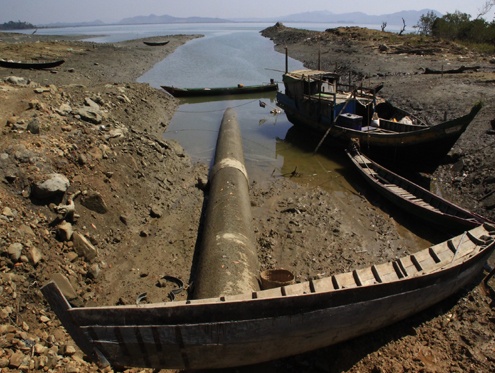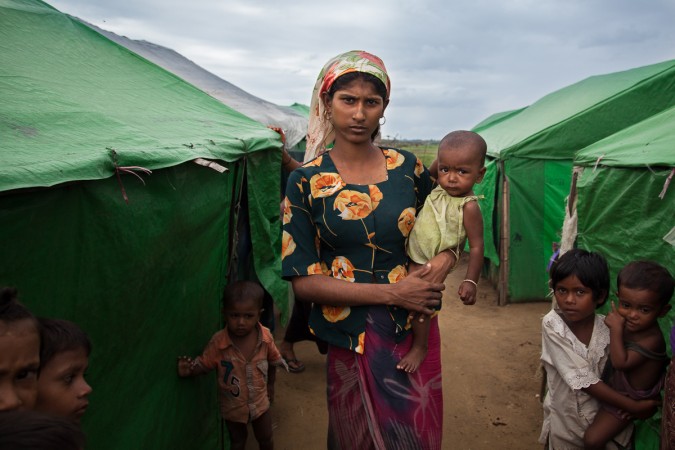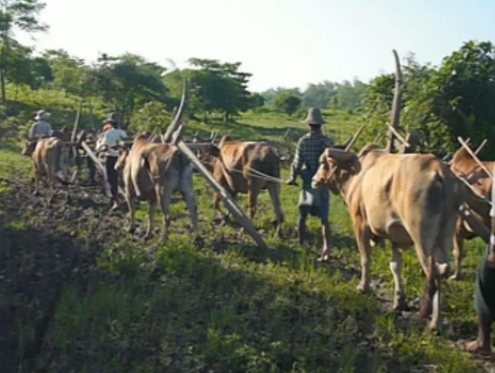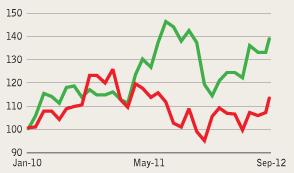Ups and downs
One US dollar was buying 968 kyat on Friday, one kyat up from the week before. Selling rate is 975 kyat to the dollar.
The price of gold dipped to just 677,500 kyat per tical this week before bouncing back to 685,000 kyat on Friday. Meanwhile, fuel prices remain the same – petrol 814 kyat per litre; diesel 920; and octane 920. The cost of rice and basic commodities remains stable at Rangoon marketplaces.
Central Bank proposes lifting ban on foreign banks
The Central Bank of Myanmar has begun drafting a new law to allow foreign banks to operate in the country. Currently, overseas banks are only allowed to open branch offices in Burma but not to operate banking services. Satt Aung, the vice-president of the CBM, said allowing foreign banks to operate will be beneficial for domestic business enterprises and domestic banks.
Burmese trade up 27 percent
Trade for this fiscal year, from 1 April to 11 October, has increased by 27 percent compared to the same period last year, according to an announcement by the Ministry of Trade and Commerce. According to data from the ministry, the value of trade last year stood at almost US$9 billion while this year it hit $11.4 billion by 11 October. A significant portion of the growth came from border trade imports ($662 million last year and $916 million this year). A Burmese official hailed the efforts to crack down on contraband goods but speculated that total trade for the year will not meet the original expectation of $25.5 billion.
China, Burma ready to begin operations at nickel mines
Burma and a Chinese company are still working towards a massive nickel mining project in Mandalay and Sagaing divisions, Eleven Media reported last week, citing an official statement saying the China Non-ferrous Metal Mining Company (CNMC) and Burma’s Ministry of Mines committees and sub-committees are to initiate operations at the mine and refinery plant in the Tagaung Taung area. CNMC, which began exploring the area in 2004, has announced it has identified 700,000 tons of nickel in the area, and previously said it would begin the project in 2011, the report said.
Carlsberg tapping Pegu for that special brew
Danish beer company Carlsberg has begun construction of its factory at the Nyauninn Industrial Zone in Pegu division. Carlsberg Group’s director Daniel Sjogren said the company will invest US$50million in the joint-venture with Myanmar Golden Star Co Ltd, which is owned by business tycoon “Pepsi” Thein Tun, his nickname stemming from his initiative to brink the US soft drinks firm to Burma in 1991. The joint-venture will reportedly introduce a new beer brand under a Burmese name which is to be distributed in Asia and Europe. Currently, Myanmar Beer and Tiger Beer have the largest market share in Burma, but Heineken and Thai beer firm Chang have also been given approval for manufacture.
No tax exemption for SMEs, says minister
Burma’s deputy minister of industry, Myo Aung, told the lower house on 14 October that he cannot allow SMEs tax exemption because they make up about 90 percent of the country’s business enterprises. Responding to questions regarding tax and registration exemptions and the provision of loans for SMEs, Myo Aung said that allowing exemptions for such businesses would be “impossible” and noted that the union government had already handed out loans worth up to 10 billion kyat (US$10 million) to 62 entrepreneurs.
Burma pledges to provide electricity to 20,000 villages by 2016
Burma’s Ministry of Livestock, Fisheries and Rural Development says it will work to provide electricity to 20,000 villages across the country within two years, according to the deputy minister Khin Maung Aye at a meeting with local organisations in Rangoon on 10 October. He said the ministry was currently working to build infrastructure such as roads, electricity, water and housing in rural areas across the country and had a target to provide electricity to 20,000 villages in the country by 2015-16.
China issues proposal for economic corridor to India
Dhaka has agreed to actively participate in promotion of the a proposed economic corridor linking Bangladesh, China, India, and Myanmar (BCIM), according to Bangladeshi media, citing a delegation-level meeting between Dhaka and Beijing at which China handed over a draft of a proposed framework for the BCIM economic corridor, copies of which had already been distributed to Naypyidaw and Delhi. The four countries will hold a joint working group meeting in Beijing in December, a report in Dhaka’s Daily Star said.
Canadian firm charged with illegal export of aircraft parts to Burma
The Canada Border Services Agency has charged Kenn Borek Air Ltd of Calgary, and its former general manager, Stephen Penikett, with unlawfully exporting goods to Burma, according to Canadian media. It is alleged the company exported one de Havilland DHC-6 Twin Otter airplane as well as 149 aircraft parts to Burma without valid export permits in November 2007. Goods may only be exported to Burma with an export permit issued by Foreign Affairs and International Trade Canada, said CBC News, noting that the maximum fine under Canadian law is a $500,000 fine or five years in prison or both. A trial begins on 14 December.
Burma seeks bids for low-head dam construction on upper Irrawaddy
Burma’s transportation minister Nyan Tun Aung said that some US$7million is to be spent on an assessment to build 17 low-head dams on the upper Irrawaddy River with help from Belgium. At a press conference on 14 October the minister said he will soon invite tender bids to build the first dam, possibly either at Yandabo, Lanywa, Minhla or Yoneseik. He said the project, being implemented under the president’s instructions, will be beneficial as it will allow smoother transportation on the river and also provide hydropower for local farms.
Burma’s ‘Oscars’ up for tender
The Myanmar Film Association is to invite tender bidders to host this year’s national Academy Awards event, according to a statement following an association meeting in Rangoon on 16 October. The bids must include costs for stage design, the installation of a digitalised system and lighting, said MFA which plans to launch itself as a private company in the near future. The 2011 Academy Awards (held late in 2012) was held at Rangoon’s Thuwanna stadium but it is still unclear where and when this year’s event will be hosted.






